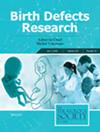A Narrative Review on the Effect of Valproic Acid on the Placenta
Abstract
Background
Valproic acid (VPA) is an antiepileptic and mood-stabilizing drug with well-established teratogenic risks when taken during pregnancy. While its harmful effects on fetal development are well known, less attention has been given to its impact on placental development and function, despite the placenta's critical role in pregnancy.
Aim
This narrative review examines how VPA exposure affects placental growth, morphology, nutrient transport, and epigenetic modifications. It also considers whether placental dysfunction may contribute VPA's teratogenic effects.
Results
Evidence suggests that VPA disrupts placental structure and growth, alters the expression of nutrient transporters, such as those for folate, glucose, and amino acids, and modifies the placental epigenome, including globally decreased DNA methylation and increased histone acetylation.
Discussion
It is hypothesized that these epigenetic changes may influence chromatin remodelling and trophoblast gene expression, though this connection has not been fully established. Such epigenetic dysregulation may result in aberrant gene expression that underlies the structural and functional impairments observed in the placenta, potentially compromising its ability to support fetal development and contributing to VPA's teratogenic effects. Findings across studies, however, are inconsistent, varying with dose, timing of exposure, and model system. Furthermore, there is a lack of research examining sex-specific differences in placental responses to VPA, despite evidence that male and female placentas exhibit distinct growth patterns, gene expression profiles, and susceptibilities to environmental insults.
Conclusion
Addressing these knowledge gaps through targeted research will improve our understanding of how VPA affects the placenta and its role in teratogenesis.


 求助内容:
求助内容: 应助结果提醒方式:
应助结果提醒方式:


